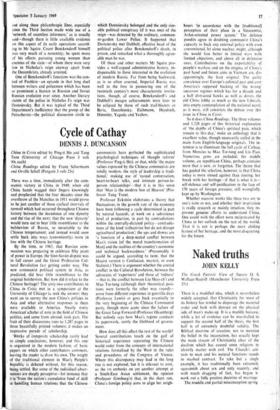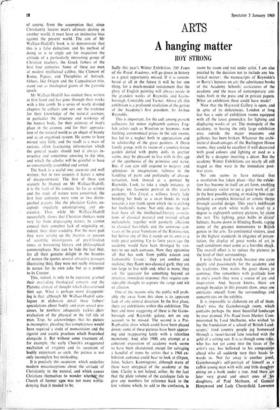Naked truths
JOHN KELLY
The Greek Patristic View of Nature D. S. Wallace-Hadrill (Manchester University Press 35s) There is a muddled idea, which is nevertheless widely accepted, that Christianity for most of its history has tended to disparage the material order and look with distrust on the physical side of man's make-up. It is a muddle because, while a lot of evidence can be marshalled to support the second half of the thesis, the first half is of extremely doubtful validity. The Biblical doctrine of creation, not to mention the belief in the incarnation, has usually kept the main stream of Christianity clear of the dualism which has caused some religions to identify matter with evil. The Church's atti- tude to man and his natural functions stands in marked contrast. To take but a single example, it has traditionally been extremely squeamish about sex and only recently, and with much dragging of feet, has begun tr work out a fully positive doctrine of marriage The muddle and partial misconception spring of course, from the assumption that, since Christianity locates man's ultimate destiny in another world, it must have an instinctive bias against the present world. The aim of Mr Wallace-Hadrill's book is to demonstrate that this is a false deduction, and his method of doing so is to single out for inspection the attitude of a particularly interesting group of Christian teachers, the Greek fathers of the first four centuries. Some of these are men of modest intellectual calibre, like Clement of Rome, Papias, and Theophilus of Antioch. Others, like Origen and the Cappadocian trio, stand out as theological giants of the patristic epoch.
Mr Wallace-Hadrill has studied these writers at first hand and has gone through their works with a fine comb. In a series of neatly divided chapters he collects and sets out the evidence for their knowledge of the natural sciences, in particular the structure and workings of the human body, for their estimate of man's place jn the cosmos, and for their apprecia- tion of the natural world as an object of beauty and as an organised system. He seems to have missed very little, and the result is a mass of curious, often fascinating information which the general reader should find it always in- structive and sometimes amusing to dip into, and which the scholar will be grateful to have so conveniently assembled and sorted.
The book is a useful one, accurate and well written; but in two respects it leaves a sense of disappointment. The first of these can scarcely be blamed on Mr Wallace-Hadrill; it is the fault of his sources. So far as science and the study of nature were concerned, the first four centuries were (one or two distin- guished pagans, like the physician Galen,, ex- cepted) singularly unenterpfising, and un- creative. Thus, while Mr Willace-Hadrill successfully shows that Christian thinkers were very far from disparaging nature, he cannot conceal their complete lack of originality or, indeed, their sheer credulity. For the most part they were serving up the theories or guesses of scientific investigators of pre-Christian times, or borrowing literary and philosophical commonplaces. Nor can he hide the fact that, for all their genuine delight in the beauties of nature (he quotes several attractive passages illustrating this), they were not really interested in nature for its own sake but as a pointer to its Creator.
This, indeed, is only to be expected, granted their overriding theological concern and the Platonic climate of thought which characterised their age. What is perhaps more disappoint- ing is that, although Mr Wallace-Hadrill cata- logues in elaborate detail these fathers' speculations about bodily and even sexual pro- cesses, he nowhere adequately tackles .heir evaluation of the physical in the full life of man. True, he acknowledges that his picture is incomplete, pleading that-completeness would have required a study of monasticism and the rigorist and ascetic practices which flourished alongside it. But without some treatment of, for example, the early Church's :exaggerated exaltation of virginity and its suspicion of bodily enjoyment as such: the picture is not only incomplete but misleading.
It is precisely this suspicion; which underlies modern misconceptions about the attitude of Christianity to the natural, and which. causes Christians themselves to wonder whetlikthe Church of former ages was not more world- denying than it needed to be.



































 Previous page
Previous page